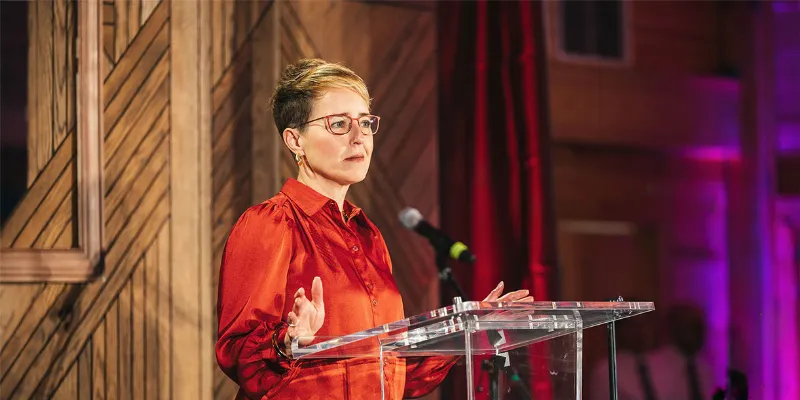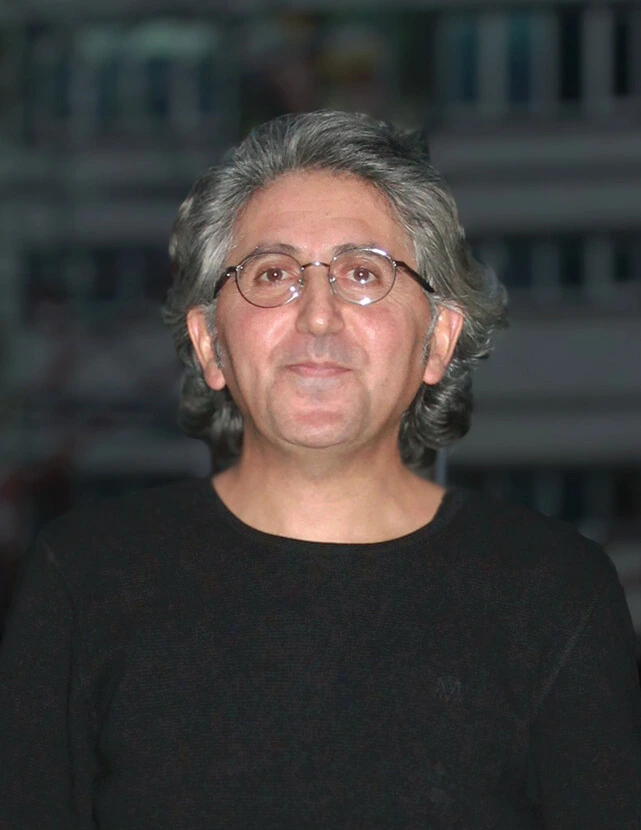The V Foundation’s Role in Advancing Cancer Research and Supporting Women Scientists


ONCOLife |
15 February 2024
In an exclusive interview with ONCOLife, Dr. Susanna Greer, Chief Scientific Officer at the V Foundation, highlighted the organization's dedication to groundbreaking cancer research and the importance of supporting women in the field. She discussed how initiatives such as "The Women Scientists Innovation Award for Cancer Research" are crucial in addressing existing gender disparities by promoting diversity in research, ultimately advancing the fight against cancer.
Dr. Susanna Greer, shares how coming from a family of farmers led her to become a pivotal figure in cancer research and advocacy. Inspired by cancer impacting her family, Dr. Greer pursued an illustrious career in research, culminating in roles at the American Cancer Society and the V Foundation.
Empowering Innovation
Dr. Susanna Greer: The V Foundation aims to support exceptional researchers at pivotal career moments, supporting ambitious projects in the fight against cancer. With over $353 million granted, its researchers have produced more than 98,000 publications, been connected to 1,000+ clinical trials, and received 5,600+ additional grants, generating over $19.4 billion in research funding.
Click the picture to view the PDF version: Pg 8-13.
Breaking Barriers in Cancer Research
Could you give us an overview of your background, including what inspired you to pursue a career in cancer research?
Dr. Susanna Greer: Having been raised on a pesticide-exposed farm, cancer significantly impacted my family. My interest in math and science led me to study chemistry in undergraduate, opting for research over medical school to make a meaningful difference in the fight against cancer.
I completed my PhD in microbiology and immunology at the Wallace Tumor Institute, University of Alabama, and pursued a postdoctoral fellowship in immunology focusing on cancer immunotherapy at the Lineberger Comprehensive Cancer Center, University of North Carolina. My research, in the early 2000s, centered on autoimmune diseases and cancer.
I then led a research lab at Georgia State University for 12 years where my team and I focused on the immune response to cancer and was responsible for key findings in molecular immunology and new epigenetic targets. Later, seeking broader impact, I joined the American Cancer Society and then the V Foundation, leveraging my expertise to influence cancer research in new ways.
After an accomplished career in scientific research and academia, what motivated your transition to the V Foundation?
Dr. Greer: Understanding the firsthand challenges of research is crucial to my role; the journey is tough, marked by the struggle to interpret data, comprehend clinical outcomes, and face frequent grant rejections. Yet, the fulfillment it brings is unparalleled. My daily motivation is to support our grantees by attracting innovative researchers to the field and recognizing the rare, yet profoundly satisfying, victories in this demanding field.
The V Foundation stands out because, thanks to an endowment, it guarantees that 100% of designated funds go directly to research. As Chief Scientific Officer, I’ve seen firsthand our commitment to funding the world’s most outstanding cancer researchers. This ensures that every donation maximally impacts advancing cancer research, so fewer people have to endure its hardships.
Guiding the Next Generation Towards Excellence and Innovation
As a leader in the scientific community, how do you approach mentorship, and what advice do you have for young scientists, especially women, aspiring to careers in research?
Dr. Greer: Dive into cancer research if you’re passionate about science and challenges; it encompasses hundreds of diseases needing brilliant minds. Mentorship is crucial; once you achieve success, it’s important to help others climb up too. Mentoring is about passing on knowledge to help others avoid the same pitfalls and hoping those behind you will surpass you, enriching the field. For women, and anyone feeling underrepresented in research, finding a mentor means trusting your gut and recognizing someone who would advocate for you in your absence.
Looking back on your career so far, what do you consider to be your most significant achievements or milestones?
Dr. Greer: I enjoyed my job and didn’t leave academia out of dissatisfaction. Training scientists is a high point, and I’ve kept in touch with all my mentees, who now excel in various research areas. They’re making impactful contributions to cancer research beyond my expectations. This collective achievement underscores the value of nurturing a diverse group of scientists.
Science is competitive, and while I excelled in writing grants and research, my passion lies in making others love science as I do. Transitioning from academia to founding my firm, then to the American Cancer Society, and now the V Foundation, I no longer conduct research but support scientists who do. That’s my greatest achievement.
Jim Valvano: Don’t give up. Don’t ever give up!
Could you provide a brief overview of the V Foundation, its founding principles, and mission in the fight against cancer? How these principles guide the Foundation’s strategic goals?
Dr. Greer: The V Foundation was founded in 1993 in honor of legendary basketball coach Jim Valvano, and the V’s core principle was inspired by Valvano himself: “Don’t give up. Don’t ever give up!”® This enduring message has guided the organization for over 30 years and allowed us to fund the best and brightest cancer researchers to accelerate Victory Over Cancer.®
How have the V Foundation’s grants directly impacted cancer research advancements, and could you highlight a particularly successful project or success story that exemplifies the Foundation’s mission in action?
Dr. Greer: The V Foundation has awarded over $353 million in research grants, including a record-breaking year in 2023, and that research is working, contributing to a 33% decline in cancer death rates since 1991. One researcher I want to highlight is David Tweardy, MD who received a translational grant from the V Foundation in 2014 for research on triple-negative breast cancer (TNBC), which accounts for 10-15% of breast cancer cases, often in women under 40, Black women, and those with a BRCA1 mutation. He and others discovered STAT3’s role in tumor growth in about 70% of TNBC cases. His grant explored blocking STAT3 as a treatment, using screening technology to review nearly a million compounds.
In animal models, Dr. Tweardy discovered that a STAT3 inhibitor, TTI-101, inhibited tumor growth alone and with chemotherapy, leading to a phase one clinical trial for safety and dosing in advanced solid tumors, including breast cancer, presented at ASCO 2023. The work, funded in part by the V Foundation, was critical in transitioning the inhibitor from preclinical to clinical studies and also necessary to attract additional funding for Tvardi Therapeutics to further develop the clinical pipeline with this molecule. The ongoing clinical trials with TTI-101 show promise across various tumors, particularly hepatocellular carcinoma, embodying Jim Valvano’s vision and the V Foundation’s mission to support groundbreaking research.
In your role, how do you collaborate with the V Foundation’s Scientific Advisory Committee to steer funding towards groundbreaking research?
Dr. Greer: The V Foundation’s Scientific Advisory Committee of the world’s leading physicians and scientists plays a crucial role in reviewing and recommending the best research proposals. Proposals are exclusively solicited from 72 National Cancer Institute-designated centers and other top institutions in North America. This collaboration is essential in selecting which outstanding projects to fund.
The V Foundation Aims for Victory Over Cancer
Could you share your vision for the future of cancer research at the V Foundation, and discuss the biggest challenges in funding cancer research today?
Dr. Greer: The V Foundation’s vision is to achieve Victory Over Cancer®, which means we need to address health disparities, such as the 12% higher cancer death rate in Black people compared to White people in 2020. To increase survivors, our Scientific Advisory Committee needs to direct funds toward areas of significant need, like colorectal cancer, which is the V Foundation’s “fund-a-need” initiative this year.
“Fund-a-need” educates donors on critical research areas identified and approved by the Scientific Advisory Committee and we encourage cancer centers to submit their best ideas and researchers for consideration. The focus shifts annually based on the committee’s recommendations. This approach ensures funding is directed towards significant challenges in cancer research, fostering a comprehensive and strategic response.
Reflecting on the V Foundation’s journey, what are some of the significant impacts the Foundation has had on cancer research, and how do these achievements shape your plans?
Dr. Greer: The V Foundation has awarded over $353 million in cancer research grants. Each grant funds a study that supports a lab, including technicians, graduate students, and fellows, leading to research publications. These publications inspire further research, hypotheses, and eventually clinical trials for new drugs, each starting from a single patient’s bravery to participate in a clinical trial.
The V Foundation aims to support exceptional researchers at critical career junctures, funding high risk, high reward projects. Beyond the $353 million awarded, the Foundation’s researchers have produced over 98,000 publications, contributed to 1,000+ clinical trials, and secured 5,600+ subsequent grants. This has generated over $19.4 billion in research funding, showcasing an unparalleled return on investment and highlighting the Foundation’s crucial impact on cancer research.
The V Foundation and Women in Cancer Research
In your experience, how do gender disparities specifically affect cancer research and the progression of women in field?
Dr. Greer: Research reveals women scientists receive 38% less funding than male counterparts, facing salary disparities, lower startup funding, and fewer awards. The pandemic worsened these inequalities, with women bearing more caregiving responsibilities, impacting their research time. Female-led labs struggled to maintain research while managing the well-being of their team and families amidst homeschooling challenges.
Consequently, publications and grant submissions by women have declined since the pandemic, exacerbating pre-existing issues in academic and research environments. Inspired by Ruth Bader Ginsburg, I believe in taking action against inequalities. Ginsburg stated, “women belong in all places where decisions are being made,” urging us to address and act upon injustices in our lives.
Could you tell us more about “A Grant of Her Own: The Women Scientists Innovation Award for Cancer Research” initiative and its impact so far?
Dr. Greer: “A Grant of Her Own” is an initiative I’m passionate about to address gender disparities in cancer research by funding early career female researchers. Last year, the V Foundation introduced this legacy grant, awarding $8 million to women in various cancer research fields. The response to our call for applications has been overwhelming, underscoring the program’s impact not just on cancer research but also in supporting women’s continued careers in this vital field. This commitment is driven by the goal to end cancer, requiring all minds to contribute their perspectives and expertise to the field.
How has your personal journey as a woman in science shaped your approach to leadership and advocacy in cancer research?
Dr. Greer: When I was an assistant professor, starting my own lab, life threw me a curveball—I had a baby. It wasn’t something I had planned for, and suddenly, I was navigating not just the complexities of a new, demanding job but also the profound journey of becoming a first-time mom. I honestly don’t think I would be where I am today if it hadn’t been for the incredible women in my department.
They stepped in with a kindness and support I’ll never forget. They told me, “We’ve got you, girl. You can do this,” and I clung to those words like a lifeline. Their belief in me taught me the power of asking for help, something I want to pass on. No matter how tough it gets, there’s always someone willing to lend a hand. I’m here, years later, with a 17-year-old who stands as living proof that with a little help, you can make it through. So, don’t hesitate to reach out. You’re not alone in this. So just ask.











Comments
No Comments Yet!